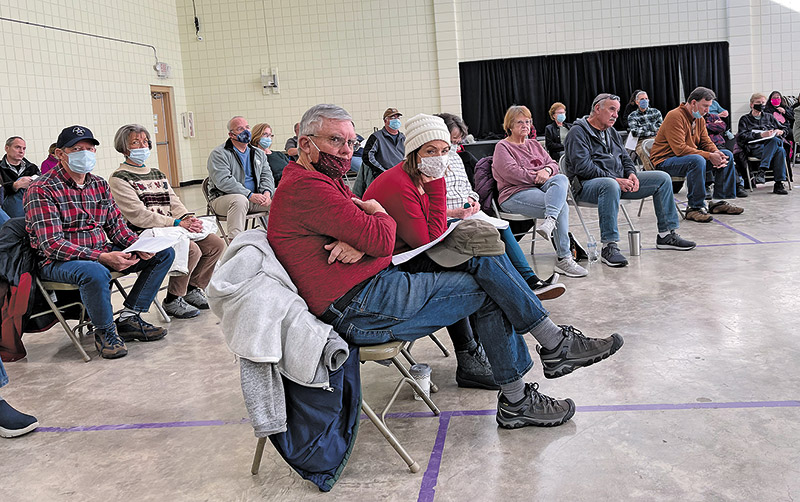Speakers mostly oppose Norris short-term rentals

About 50 people turned out at the Norris Community Center on Saturday morning for a town-hall-style meeting to discuss a proposed city ordinance to regulate short-term housing rentals in Norris. (photo:G. Chambers Williams III )
The Norris City Council heard from about a dozen of the approximately 50 residents who showed up for a discussion about a proposed city ordinance to regulate the popular tourist-style rental format, with most saying they believe allowing such rentals would be detrimental to life in Norris, and negatively affect property values.
Short-term rentals are defined by Tennessee law as being overnight accommodations, other than hotel and bed-and-breakfast lodgings, of at least one night, but no longer than 30 nights. They have become popular worldwide through such online services as Airbnb and Vrbo (Vacation Rental by Owner).
The draft ordinance, submitted to the City Council in October by the Norris Planning Commission, would regulate such rentals, including imposing allowable taxes on them and putting some limits on them.
On Monday night, the council voted to have a special “workshop” meeting at 5 p.m. Jan. 24 to write a proposed final version of the ordinance.
Mayor Chris Mitchell kicked off the Saturday meeting telling residents the council was not there to inform them of something that was about to happen.
“This is us getting your input,” he said. “There is some sense of urgency because we already have some [short-term rentals].
“I do have a very firm view on this,” the mayor continued. “But I want to hear you. … The view I have as it stands is I want this [ordinance] to be very restrictive. I feel that an ordinance is needed, because without one, there is not a way for us to manage it.
“Without an ordinance, those of you that don’t want [short-term rentals], the answer is not to do nothing. Because there are some now operating. … My view is very restrictive, and [that] there is a balance between individual rights and societal rights. … It needs to be fair and [with a] balance that protects both individual and societal rights.” Spencer Boardman was among those pushing for a strong ordinance.
“I would like us to restrict short-term rentals as much as the law will allow,” he said. “It does impact your property values.
“It would be a nuisance in a community so densely populated [as Norris],” he said.
Echoing that sentiment was Jim Peacock, who said: “I’m for the most-restrictive ordinance we can have.”
Niki Nicholas, a part-time Norris resident who also lives in Oneida, expressed her opposition to short-term rentals, basing her objections on the high population density of some of the traditional Norris neighborhoods.
Nicholas, who is superintendent of the National Park Service’s Big South Fork National River and Scenic Area in Tennessee and Kentucky, said she believes that allowing short-term rentals in a high-density Norris neighborhood could make it become “very unlivable … the community feeling changes.”
She also suggested that any member of the City Council who owns a short-term rental property in Norris should not be “voting on this.” That was in reference to newly appointed Councilman Robert Sain, who operates a short-term rental on his property adjacent to the Museum of Appalachia, in an area fairly recently annexed into the city of Norris.
Others spoke in similar opposition, with at least one speaker, Harry Shatz, suggesting that various Norris neighborhoods should form “homeowners’ associations,” which, under Tennessee law, have the authority to ban short-term rentals in their communities.
Local real estate broker Loy Johnson said her personal stance would be “We’re just not going to do this” (allow short-term rentals in Norris). But she conceded that Tennessee law does not allow communities to ban such rentals.
“We need to make a very good, tight ordinance for this,” Johnson said.
Bill Ross, a member of the Planning Commission who worked on creating the draft measure the council tabled in October, said, “I am 100 percent in favor of the ordinance.
“I myself do not support the idea of short-term rentals, but I believe it is the right of people who own property to rent their property,” Ross said.
He suggested that the city consider a “phased approach” to regulating short-term rentals, beginning with a brief moratorium on new ones until the ordinance can be finalized and approved by the council.
“We have not seen a bunch of these, but we know it is a growing trend,” he said.
Stephanie Wells, Anderson County’s director of tourism, told the group that there already are about 80 listed short-term rental properties in the county, among about 25,000 residences.
“We have seen them in Norris,” she said. “This is happening. And your ordinance is your best chance of regulating it.”
During the October council meeting, the council voted to table the measure for further study after Mitchell and Councilman Will Grinder expressed opposite views on it. Grinder told fellow council members that he believed the proposed ordinance was too strict, while Mitchell said he felt it was too lenient.
Mitchell has said he wants the ordinance to be strict enough to stop investors from buying multiple properties in Norris for the purpose of setting up short-term rentals to create a sort of “hotel” in the city.
“This [will have] probably the biggest impact to the quality of life … that we have in Norris,” the mayor said earlier.
The draft ordinance – as it is now written – can be found on the Norris city website at cityofnorris.com.
The final version that the council would vote on could be presented in February.
has not yet been written, and still would be subject to revision until it’s passed on second/final reading.


